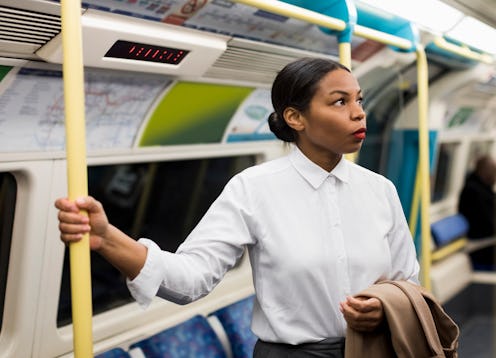Health
Practical Steps To Take If You're Feeling Anxious In The Wake Of A Terrorist Alert
What to do if the terrorism threat level being raised to "severe" has worried you.

Sadly, terror attacks have always been a fact of life. But with social media and a 24-hour news cycle, it’s easier than ever to get caught up in each incident that occurs. On Nov. 3 the UK terror threat was raised from “substantial” to “severe.” This means that security chiefs believe an attack is highly likely although the BBC has reported there’s no specific intelligence of an imminent incident. This kind of news can be really scary so here are a few tips on what to do if you feel anxious about travelling after a terrorist attack.
The terror threat was raised in the UK after a shooting incident took place in Vienna on Nov. 2 that killed four people. Similarly, last month a teacher was killed in Paris and three people died in a knife attack in Nice.
A study in 2018 placed terrorism as one of the greatest fears among 11- to 16-year-olds. More than two-thirds of the 1,500+ teenagers surveyed expressed fears about the threat of terrorism. And it's not just young people who are afraid. But how can you recognise if you are suffering more than you should be when it comes to concerns around terrorism?
How to recognise anxiety
The NHS website describes anxiety as, "a feeling of unease, like a worry or fear, that can be mild or severe."
Anxiety can manifest itself in different ways. You may feel overwhelmingly uncomfortable in certain places or situations or you may feel your heart race, palms sweat, and your body become slightly shaky. You may notice that you feel like this when doing certain activities or it may be an underlying feeling you have often. Due to the pandemic more people are reporting feelings of anxiety when going out in public.
The NHS goes on to state: "Everyone feels anxious from time to time and it usually passes once the situation is over." You’re currently living through a global pandemic so it’s totally normal that you’d feel ill at ease when doing things like going to the shop. And rise in the terror alert will only add to this. However, if you find that these feelings keep coming back, or that they are interrupting your day-to-day life, it may be time to consider what's going on more closely.
What to do if you’re anxious about travelling after a terrorist attack
1. Don’t track down every piece of information
It can be tempting to track down every piece of information about an attack. "We sometimes seek out information that exacerbates how we’re feeling," Psychotherapist and Founder of the Recovery Clinic Emmy Brunner explains. "We get on the internet and read a lot of stuff and it fuels the fear." It's important to know the facts, but make sure you know where the line is for you.
2. Put it in perspective
According to research collected over the last decade by the Global Terrorism Database at the University of Maryland, the chance of being murdered in a terrorist attack on British soil is about one in 11.4 million per year. In other words, it’s highly unlikely.
“Try and get some perspective on things. These are really horrendous events but they’re not events that happen every day,” says Brunner. "They occur to a small number of people, and when they do it’s horrendous, but you’ve got to make a decision about how you’re going to respond. Are you going to be someone who allows those events to dictate your life or are you going to go on doing what you’re doing in spite of those things?"
3. Don't avoid travelling
For some, anxiety about terror attacks goes into overdrive when thinking about travelling. However, echoing what Brunner says above, it's important to stick to your normal routine and not let fear stop you from acting as you otherwise would.
4. Practice mindfulness
It is widely recognised that grounding yourself in the moment (aka practicing mindfulness) will help calm you in moments of intense anxiety. If you are out and about and start to experience severe anxiety, try to bring yourself back by listing off everything you can see, hear, smell, and touch at that present time. This will help quiet your mind and stop your thoughts from racing off track.
5. Be compassionate towards yourself
Feeling scared after something like a terror attack is totally normal and Brunner emphasises that you need to be compassionate towards yourself. "A lot of people get annoyed with themselves for feeling scared after something like this but what you need is kindness and compassion," she explains.
This article was originally published on